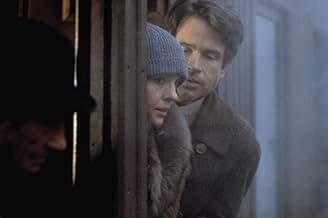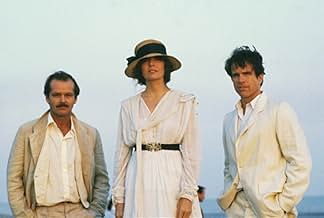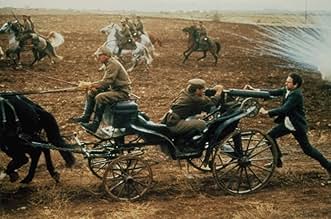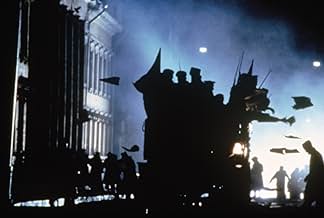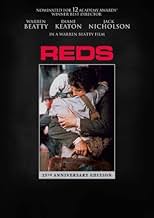A radical American journalist becomes involved with the Communist revolution in Russia, and hopes to bring its spirit and idealism to the United States.A radical American journalist becomes involved with the Communist revolution in Russia, and hopes to bring its spirit and idealism to the United States.A radical American journalist becomes involved with the Communist revolution in Russia, and hopes to bring its spirit and idealism to the United States.
- Director
- Writers
- Stars
- Won 3 Oscars
- 22 wins & 37 nominations total
Eleanor Wilson
- Mrs. Reed
- (as Eleanor D. Wilson)
- Director
- Writers
- All cast & crew
- Production, box office & more at IMDbPro
Featured reviews
An engrossing film about John Reed's love affair with Louise Bryant and his struggles in the midst of the Russian Revolution. There are great performances from Beatty, Keaton, Nicholson (excellent as Eugene O'Neill) and Stapelton in her Oscar winning performance as Emma Goldman. Beatty's precision and timing in the use of his camera in this picture is a superb achievement. There is a touch of David Lean in director Beatty in this film. The color, the editing, the sound. All of those important filmic elements are at play here in great form. Beatty won the Best Director Oscar, but lost the Best Picture award to Chariots of Fire.
This movie was great, and I hope it comes out on DVD real soon. Beatty became Reed in more than one sense--not only did he act the part, but he directed the movie in a way reminiscent of the kind of "new journalistic" style that Reed and his fellow MASSES writers pioneered, mixing the drama with interviews of people who knew JR, Louise, etc.
The film also sort of puts forward the question, "What if, instead of running back to Russia (to die of kidney failure and mistreatment by the CP), Jack Reed had stayed in this country to build the CP? Would it have turned out to become Stalinist?" According to Howe and Coser, who wrote a good book on THE AMERICAN COMMUNIST PARTY, much like Rosa Luxemburg and Karl Liebknecht in Germany, Reed was the ONLY leader who was independent, who had some real backbone.
The best part of the movie is when Emma Goldmann, played by Maureen Stapleton, tells Jack that "it doesn't work" (i.e. statist, bureaucratic socialism that the Bolsheviks were instituting as a grossly mistaken response to the economic crisis and Allied invasion of Russia after the Revolution). And then his rebellion against the lying propaganda of Zinoviev. Kind of hits me right now that Jerzy Kosinski should play Zinoviev--didn't he commit suicide when he was exposed as a plagiarist? Where is the line between art and reality, politics and life?
Of course I loved the romantic reality between Beatty, Bryant, and Nicholson (Reed, Bryant, and Eugene O'Neill). And the cynicism that Reed expresses about the Democrats and Wilson is certainly apropos today.
The film also sort of puts forward the question, "What if, instead of running back to Russia (to die of kidney failure and mistreatment by the CP), Jack Reed had stayed in this country to build the CP? Would it have turned out to become Stalinist?" According to Howe and Coser, who wrote a good book on THE AMERICAN COMMUNIST PARTY, much like Rosa Luxemburg and Karl Liebknecht in Germany, Reed was the ONLY leader who was independent, who had some real backbone.
The best part of the movie is when Emma Goldmann, played by Maureen Stapleton, tells Jack that "it doesn't work" (i.e. statist, bureaucratic socialism that the Bolsheviks were instituting as a grossly mistaken response to the economic crisis and Allied invasion of Russia after the Revolution). And then his rebellion against the lying propaganda of Zinoviev. Kind of hits me right now that Jerzy Kosinski should play Zinoviev--didn't he commit suicide when he was exposed as a plagiarist? Where is the line between art and reality, politics and life?
Of course I loved the romantic reality between Beatty, Bryant, and Nicholson (Reed, Bryant, and Eugene O'Neill). And the cynicism that Reed expresses about the Democrats and Wilson is certainly apropos today.
Bolshevik leader V.I. Lenin once wrote, "The capitalists will sell us the rope with which we will hang them."
Lenin's quote came to mind when I was watching one of the most spellbinding movies to come along in years,and not since David Lean's brilliant 1965 epic classic "Doctor Zhivago" hasn't been a movie in recent memory that has come close. That motion picture is "Reds",released in 1981 by Paramount Pictures. The film was Warren Beatty's peeve project which he served not only as it star,but also the co-writer and direction. Director Warren Beatty's epic love story about American writers John Reed and Louise Bryant,set amid of the turbulence of American politics in the 1910's World War I and the Russian revolution that set this movie into plain focus. The movie itself is astounding to behold and is a tragic love story between the writers John Reed(Warren Beatty),and Louise Bryant(Diane Keaton). But it creatively used artsy,radical Greenwich Village in the 1910's-and such as real-life characters as playwright Eugene O'Neill(Jack Nicholson),and anarchist activist Emma Goldman(Maureen Stapleton)-as well as the drama of the Russian Revolution and the subsequent civil war as the principal landscapes in which their relationship plays out.
Director Beatty also made creative use of on-camera "testimony" by the likes of novelists Henry Miller and Rebecca West,Republican politician Hamilton Fish,comic George Jessel and civil libertarian Roger Baldwin. These senior citizens recall,with varying degrees of historical accuracy,Reed,Bryant and the times in which they lived. "Reds" shows convincingly that many of the contemporary issues in politics and culture have their antecendents in the first debates of the 20th century. Debates over birth control and abortion,marriage and commitment,public life versus private life,revolution versus reform are given full expression from varying viewpoints throughout the lengthy film(which runs over three hours). To Beatty's credit,his film captures the excitement the Bolshevik revolution stirred,both inside and outside Russia while revealing how the Bolshevik leadership quickly began to suppressing dissent within the revolutionary ranks on the way to becoming a dictatorship with a country that is in constant turmoil. Beatty's efforts certainly paid off artistically,bringing him prestige to him and Paramount making "Reds" a huge box office success for the studio when it premiered in theatres around Christmas of 1981.
"Reds" became one of the top highest grossing pictures of that year,and it paid off in high standards too. "Reds",which received 12 Academy Award nominations including Best Picture,lost an upset to Hugh Hudson's "Chariots Of Fire" in the Best Picture category. However it won three Oscars for Best Director(Warren Beatty),Best Supporting Actress(Maureen Stapleton),and Best Cimematopgraphy(Vittorio Storaro). Eventually,"Reds" made more than $40 million at the domestic box office,and once international figures were added in,it became one of the top grossing films of the 1980's. A feat Warren Beatty is still proud of to this day.
Lenin's quote came to mind when I was watching one of the most spellbinding movies to come along in years,and not since David Lean's brilliant 1965 epic classic "Doctor Zhivago" hasn't been a movie in recent memory that has come close. That motion picture is "Reds",released in 1981 by Paramount Pictures. The film was Warren Beatty's peeve project which he served not only as it star,but also the co-writer and direction. Director Warren Beatty's epic love story about American writers John Reed and Louise Bryant,set amid of the turbulence of American politics in the 1910's World War I and the Russian revolution that set this movie into plain focus. The movie itself is astounding to behold and is a tragic love story between the writers John Reed(Warren Beatty),and Louise Bryant(Diane Keaton). But it creatively used artsy,radical Greenwich Village in the 1910's-and such as real-life characters as playwright Eugene O'Neill(Jack Nicholson),and anarchist activist Emma Goldman(Maureen Stapleton)-as well as the drama of the Russian Revolution and the subsequent civil war as the principal landscapes in which their relationship plays out.
Director Beatty also made creative use of on-camera "testimony" by the likes of novelists Henry Miller and Rebecca West,Republican politician Hamilton Fish,comic George Jessel and civil libertarian Roger Baldwin. These senior citizens recall,with varying degrees of historical accuracy,Reed,Bryant and the times in which they lived. "Reds" shows convincingly that many of the contemporary issues in politics and culture have their antecendents in the first debates of the 20th century. Debates over birth control and abortion,marriage and commitment,public life versus private life,revolution versus reform are given full expression from varying viewpoints throughout the lengthy film(which runs over three hours). To Beatty's credit,his film captures the excitement the Bolshevik revolution stirred,both inside and outside Russia while revealing how the Bolshevik leadership quickly began to suppressing dissent within the revolutionary ranks on the way to becoming a dictatorship with a country that is in constant turmoil. Beatty's efforts certainly paid off artistically,bringing him prestige to him and Paramount making "Reds" a huge box office success for the studio when it premiered in theatres around Christmas of 1981.
"Reds" became one of the top highest grossing pictures of that year,and it paid off in high standards too. "Reds",which received 12 Academy Award nominations including Best Picture,lost an upset to Hugh Hudson's "Chariots Of Fire" in the Best Picture category. However it won three Oscars for Best Director(Warren Beatty),Best Supporting Actress(Maureen Stapleton),and Best Cimematopgraphy(Vittorio Storaro). Eventually,"Reds" made more than $40 million at the domestic box office,and once international figures were added in,it became one of the top grossing films of the 1980's. A feat Warren Beatty is still proud of to this day.
This is an interesting film, all the more so because it is meant to tell a true story (insofar as any film of real events is true!)
I suppose you'll either like it or loathe it. If you like it, good; it isn't a bad film, but a bit of an idea of European history will help you.
If you you fall into the latter category loathe it because you think it's a bad film not because of the stupid bigotry shown in some of the other reviews here which seem to be so hung up on the USA and Mom and apple pie that they see "Commies" in even thinking about the event of the early 20th century!
After seeing it it made me interested enough to find out about John Reed. You might not like what he thought, you might not like Warren Beatty and what he thinks but for heaven's sake don't rubbish this film simply because it's about a political system you may not like, or have been indoctrinated not to like!
It's not brilliant but neither is it a "love poem to communism".
I suppose you'll either like it or loathe it. If you like it, good; it isn't a bad film, but a bit of an idea of European history will help you.
If you you fall into the latter category loathe it because you think it's a bad film not because of the stupid bigotry shown in some of the other reviews here which seem to be so hung up on the USA and Mom and apple pie that they see "Commies" in even thinking about the event of the early 20th century!
After seeing it it made me interested enough to find out about John Reed. You might not like what he thought, you might not like Warren Beatty and what he thinks but for heaven's sake don't rubbish this film simply because it's about a political system you may not like, or have been indoctrinated not to like!
It's not brilliant but neither is it a "love poem to communism".
A fascinating, expertly made look at why "The Red Menace" never was that, here in the United States, and why the Russian Revolution never turned out to be what it could have been.
Technically, the movie is beautiful to look at, well written and well acted. It has a lot of great professional actors in it, and lots of the people who were actually there at the time this part of our history was being made. The "witnesses" device works well for Warren Beatty who as a director and writer always seems to include the easily overlooked details of the stories in most of his films. He is also at his fumbling best as John Reed, whose 10 Days That Shook The World fell into well-deserved obscurity probably almost as soon as it was written. That this great historical perspective could rise out of that is truly a testimony to Beatty's talent.
There are many great acting performances in this film, including one of Jack Nicholson's very best as Eugene O'Neil, as well as those of Paul Sorvino, Gene Hackman and George Plimpton who demonstrate the range of persons who touched Jack Reed's life. Jerzy Kozinsky is riveting as Zinoviev.
If one likes historically based dramas, this one should leave you breathless, and will probably leave you wanting to watch it more than once, just to make sure you don't miss any of the details.
10 Stars, Absolutely.
Technically, the movie is beautiful to look at, well written and well acted. It has a lot of great professional actors in it, and lots of the people who were actually there at the time this part of our history was being made. The "witnesses" device works well for Warren Beatty who as a director and writer always seems to include the easily overlooked details of the stories in most of his films. He is also at his fumbling best as John Reed, whose 10 Days That Shook The World fell into well-deserved obscurity probably almost as soon as it was written. That this great historical perspective could rise out of that is truly a testimony to Beatty's talent.
There are many great acting performances in this film, including one of Jack Nicholson's very best as Eugene O'Neil, as well as those of Paul Sorvino, Gene Hackman and George Plimpton who demonstrate the range of persons who touched Jack Reed's life. Jerzy Kozinsky is riveting as Zinoviev.
If one likes historically based dramas, this one should leave you breathless, and will probably leave you wanting to watch it more than once, just to make sure you don't miss any of the details.
10 Stars, Absolutely.
Did you know
- TriviaReportedly, Warren Beatty reshot some scenes up to 35 times. Paul Sorvino said he did as many as 70 takes for one scene, and Maureen Stapleton said she did as many as 80 takes for another. Reportedly, of this, she famously once said to Warren Beatty, "Are you out of your fucking mind?" This earned her a round of applause from the crew.
- GoofsThe Finnish doctor tells Reed that his blood pressure is too high, but at that time, hypertension was not considered a problem by most doctors, who did not even consider treating it. Not until the mid-'40s did doctors begin to understand the dangers of high blood pressure.
- Quotes
Eugene O'Neill: If you were mine, I wouldn't share you with anybody or anything. It'd be just you and me. We'd be the center of it all. I know it would feel a lot more like love than being left alone with your work.
- Crazy creditsAs the credits roll, additional interviews with the 'witnesses' play.
- Alternate versionsThree seconds of horse falls were cut from the British version. The DVD supplements showing these shots are also cut in England.
- ConnectionsFeatured in Sneak Previews: Rollover, Quartet, My Dinner with Andre, Reds (1981)
- SoundtracksYou're a Grand Old Flag
Written by George M. Cohan
Details
- Release date
- Country of origin
- Languages
- Also known as
- Comrades
- Filming locations
- Senate Square, Helsinki, Finland(on location)
- Production companies
- See more company credits at IMDbPro
Box office
- Budget
- $32,000,000 (estimated)
- Gross US & Canada
- $40,382,659
- Opening weekend US & Canada
- $2,325,029
- Dec 6, 1981
- Gross worldwide
- $40,382,788
Contribute to this page
Suggest an edit or add missing content


